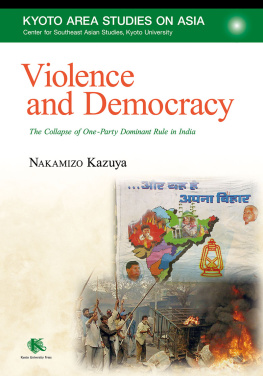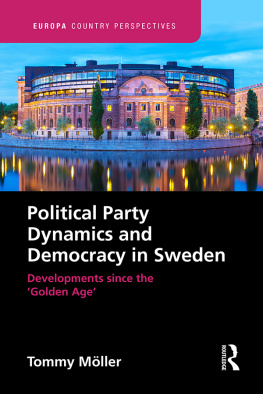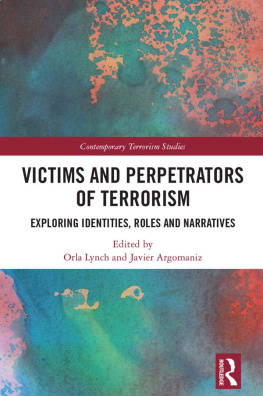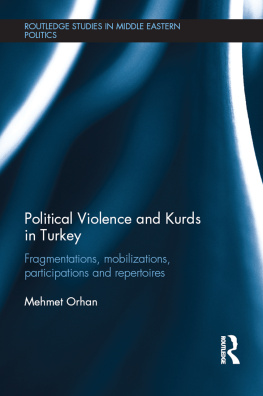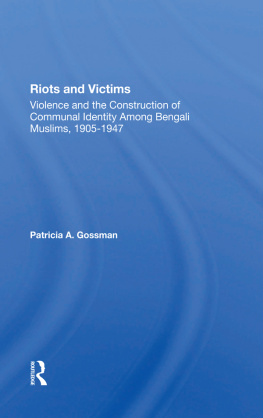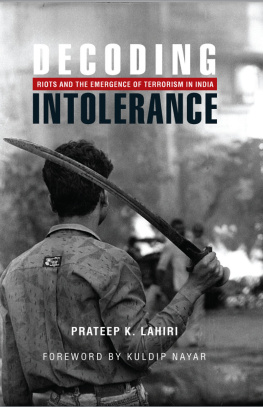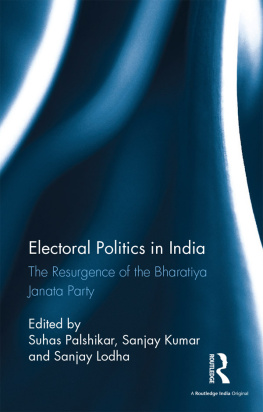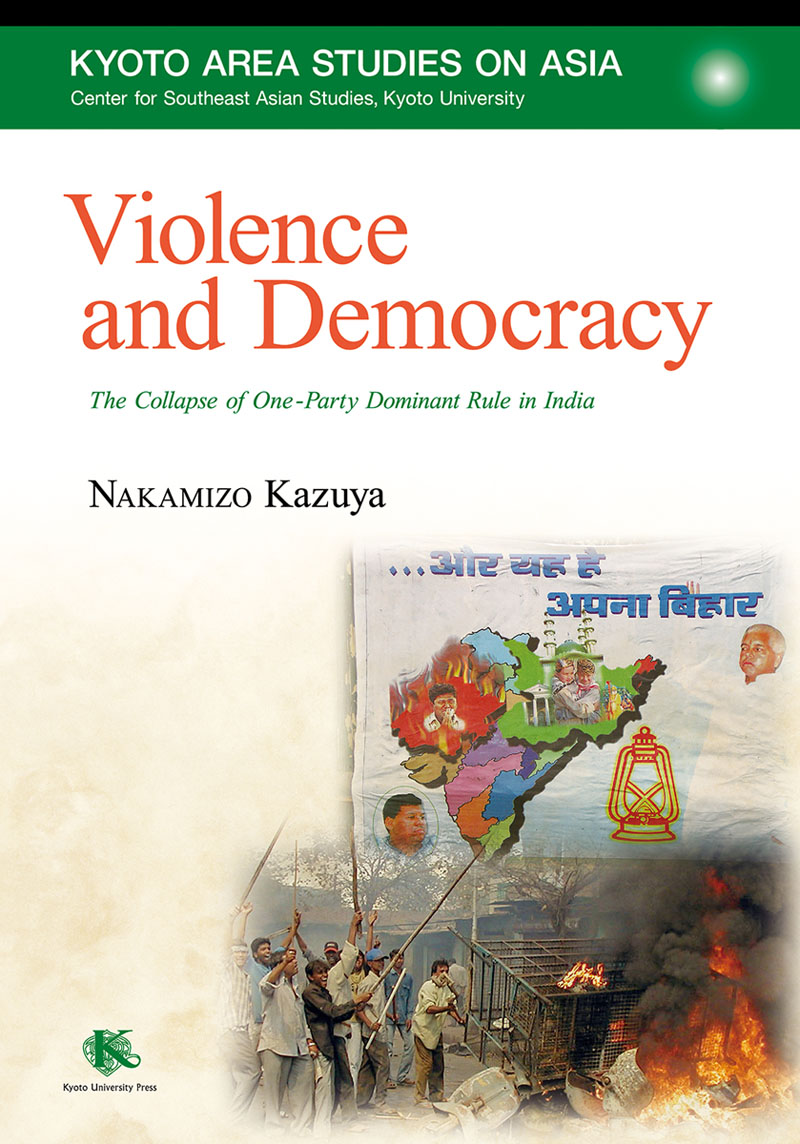

KYOTO AREA STUDIES ON ASIA
C ENTER FOR S OUTHEAST A SIAN S TUDIES, K YOTO U NIVERSITY
The Nation and Economic Growth:
Korea and Thailand
Y OSHIHARA Kunio
One Malay Village:
A Thirty-Year Community Study
T SUBOUCHI Yoshihiro
Commodifying Marxism:
The Formation of Modern Thai Radical Culture, 19271958
Kasian T EJAPIRA
Gender and Modernity:
Perspectives from Asia and the Pacific
H AYAMI Yoko, T ANABE Akio and T OKITA -T ANABE Yumiko
Practical Buddhism among the Thai-Lao:
Religion in the Making of a Region
H AYASHI Yukio
The Political Ecology of Tropical Forests in Southeast Asia:
Historical Perspectives
L YE Tuck-Po, Wil D E J ONG and A BE Ken-ichi
Between Hills and Plains:
Power and Practice in Socio-Religious Dynamics among Karen
H AYAMI Yoko
Ecological Destruction, Health and Development:
Advancing Asian Paradigms
F URUKAWA Hisao, N ISHIBUCHI Mitsuaki, K ONO Yasuyuki and K AIDA Yoshihiro
Searching for Vietnam:
Selected Writings on Vietnamese Culture and Society
A. Terry R AMBO
Laying the Tracks:
The Thai Economy and its Railways 18851935
K AKIZAKI Ichiro
After the Crisis:
Hegemony, Technocracy and Governance in Southeast Asia
S HIRAISHI Takashi and Patricio N. A BINALES
Dislocating Nation-States:
Globalization in Asia and Africa
Patricio N. A BINALES , I SHIKAWA Noboru and T ANABE Akio
People on the Move:
RuralUrban Interactions in Sarawak
S ODA Ryoji
Living on the Periphery:
Development and Islamization among the Orang Asli
N OBUTA Toshihiro
Myths and Realities:
The Democratization of Thai Politics
T AMADA Yoshifumi
East Asian Economies and New Regionalism
A BE Shigeyuki and Bhanupong N IDHIPRABA
The Rise of Middle Classes in Southeast Asia
S HIRAISHI Takashi and Pasuk P HONGPAICHIT
Farming with Fire and Water:
The Human Ecology of a Composite Swiddening
Community in Vietnams Northern Mountains
Trn c V IN , A. Terry RAMBO and Nguyn Thanh L M
Re-thinking Economic Development:
The Green Revolution, Agrarian Structure and Transformation in Bangladesh
F UJITA Koichi
The Limits of Tradition:
Peasants and Land Conflicts in Indonesia
U RANO Mariko
Bangsa and Umma:
Development of People-grouping Concepts in Islamized Southeast Asia
Y AMAMOTO Hiroyuki, Anthony M ILNER , K AWASHIMA Midori and A RAI Kazuhiro
Development Monks in Northeast Thailand
Pinit L APTHANON
Politics of Ethnic Classification in Vietnam
I TO Masako
The End of Personal Rule in Indonesia:
Golkar and the Transformation of the Suharto Regime
M ASUHARA Ayako
Grassroots Globalization:
Reforestation and Cultural Revitalization in the Philippine Cordilleras
S HIMIZU Hiromu
Conceptualizing the Malay World:
Colonialism and Pan-Malay Identity in Malaya
S ODA Naoki
Violence and Democracy:
The Collapse of One-Party Dominant Rule in India
N AKAMIZO Kazuya
First published in 2020 jointly by:
Kyoto University Press
69 Yoshida Konoe-cho
Sakyo-ku, Kyoto 606-8315, Japan
Telephone: +81-75-761-6182
Fax: +81-75-761-6190
Email:
Web: http://www.kyoto-up.or.jp
Trans Pacific Press
PO Box 164, Balwyn North
Victoria 3104, Australia
Telephone: +61-(0)3-9859-1112
Fax: +61-(0)3-8611-7989
Email:
Web: http://www.transpacificpress.com
NAKAMIZO Kazuya 2020.
Edited by Miriam Riley, Armidale, Australia.
Designed and set by Sarah Tuke, Melbourne, Australia.
Printed by Asia Printing Office Corporation, Nagano, Japan.
Distributors
Australia and New Zealand
James Bennett Pty Ltd
Locked Bag 537
Frenchs Forest NSW 2086
Australia
Telephone: +61-(0)2-8988-5000
Fax: +61-(0)2-8988-5031
Email:
Web: www.bennett.com.au
USA and Canada
Independent Publishers Group (IPG)
814 N. Franklin Street
Chicago, IL 60610
USA
Telephone inquiries: +1-312-337-0747
Order placement: 800-888-4741 (domestic only)
Fax: +1-312-337-5985
Email:
Web: http://www.ipgbook.com
Asia and the Pacific (except Japan)
Kinokuniya Company Ltd.
Head office:
3-7-10 Shimomeguro
Meguro-ku
Tokyo 153-8504
Japan
Telephone: +81-(0)3-6910-0531
Fax: +81-(0)3-6420-1362
Email:
Web: www.kinokuniya.co.jp
Asia-Pacific office:
Kinokuniya Book Stores of Singapore Pte., Ltd.
391B Orchard Road #13-06/07/08
Ngee Ann City Tower B
Singapore 238874
Telephone: +65-6276-5558
Fax: +65-6276-5570
Email:
All rights reserved. No reproduction of any part of this book may take place without the written permission of Kyoto University Press or Trans Pacific Press.
ISBN 9781920901813
Contents
Figures
Tables
Preface
This book is the English edition of Indo: Bryoku to minshushugi Itt yi shihai no hkai to aidentiti no seiji (Violence and Democracy in India: The Collapse of One-Party Dominant Rule and Identity Politics), published by the University of Tokyo Press, Japan, in 2012. The original Japanese edition was based on my Ph.D. dissertation, Bryoku no hait Indo Bihru sh ni okeru seiji hend to aidentiti no seiji (The Dividends of Violence: Political Change and Identity Politics in Bihar, India), submitted to the Graduate Schools for Law and Politics, the University of Tokyo, in March 2008 (degree awarded in November 2008), but for publication I trimmed it to half its length and added a new discussion on economic factors (). While it is unfortunate that many of my arguments had to be omitted from this book, I believe that the inclusion of the new chapter on economics added more depth to my analyses. The Japanese book won the 2012 Asia-Pacific Award of the Asian Affairs Research Council (Special Prize) and the 2013 Japan Consortium for Area Studies Award.
Many of the arguments presented within are founded on the fieldwork I conducted in the Indian state of Bihar from 2002 to 2005. Over the 12 years since my Ph.D. dissertation was completed and eight years since the publication of the Japanese edition, there has been an accumulation of important findings in the area of Indian political studies. For the publication of this English edition, however, I decided to limit changes to factual corrections and updating political situations and refrained from making major revisions to my argument. I am well aware that some of the points I make are now redundant. I am also aware that the political change that occurred from the 1980s to the early 1990s is becoming a historical subject in the context of the vigorous push toward political and social Hinduisation under the current Modi government. Nevertheless, I believe that the political shift examined in this book is an important political change that is crucial for an understanding of the Hindutva (Hinduness) politics of today and that my arguments have not lost their significance in this regard.
It took me a long time to settle on the political consequences of particular riots as my theme. Because I entered my research career through the study of war and poverty in the field of international politics, the question of violence was as important as the question of poverty in my mind. Nevertheless, it was the sheer weight of Indias reality that made me realise clearly that it should be the focus of my Ph.D. dissertation. I was fortunate enough to be given the opportunity to stay in India as a fellow of the Asian Leadership Fellowship Program sponsored by the Japan Foundation from March to October 1996 and as a researcher/advisor at the Embassy of Japan in India from December 1996 to March 1999. I was also fortunate to be a recipient of the Japanese governments MEXT (Ministry of Education, Culture, Sports, Science and Technology) Scholarship for International Research Students from March 2001 to February 2003, and was then given the opportunity to undertake field research as a fellow of the Research Fellowship for Young Scientists (PD) of the Japan Society for the Promotion of Science from April 2003 to March 2006. During each of my stays, I witnessed the serious problems confronting India.
Next page
